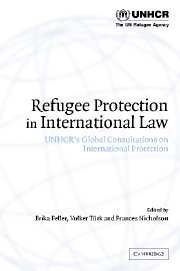Book contents
- Frontmatter
- Contents
- List of annexes
- Notes on contributors and editors
- Foreword
- Preface
- Acknowledgments
- Expert roundtables and topics under the ‘second track’ of the Global Consultations
- Table of cases
- Table of treaties and other international instruments
- List of abbreviations
- Part 1 Introduction
- Part 2 Non-refoulement (Article 33 of the 1951 Convention)
- Part 3 Illegal entry (Article 31)
- Part 4 Membership of a particular social group (Article 1A(2))
- Part 5 Gender-related persecution (Article 1A(2))
- Part 6 Internal protection/relocation/flight alternative
- Part 7 Exclusion (Article 1F)
- Part 8 Cessation (Article 1C)
- Part 9 Family unity (Final Act, 1951 UN Conference)
- Part 10 Supervisory responsibility (Article 35)
- 10.1 Supervising the 1951 Convention Relating to the Status of Refugees: Article 35 and beyond
- 10.2 Summary Conclusions: supervisory responsibility, expert roundtable, Cambridge, July 2001
- 10.3 List of participants
- Index
10.2 - Summary Conclusions: supervisory responsibility, expert roundtable, Cambridge, July 2001
Published online by Cambridge University Press: 28 August 2009
- Frontmatter
- Contents
- List of annexes
- Notes on contributors and editors
- Foreword
- Preface
- Acknowledgments
- Expert roundtables and topics under the ‘second track’ of the Global Consultations
- Table of cases
- Table of treaties and other international instruments
- List of abbreviations
- Part 1 Introduction
- Part 2 Non-refoulement (Article 33 of the 1951 Convention)
- Part 3 Illegal entry (Article 31)
- Part 4 Membership of a particular social group (Article 1A(2))
- Part 5 Gender-related persecution (Article 1A(2))
- Part 6 Internal protection/relocation/flight alternative
- Part 7 Exclusion (Article 1F)
- Part 8 Cessation (Article 1C)
- Part 9 Family unity (Final Act, 1951 UN Conference)
- Part 10 Supervisory responsibility (Article 35)
- 10.1 Supervising the 1951 Convention Relating to the Status of Refugees: Article 35 and beyond
- 10.2 Summary Conclusions: supervisory responsibility, expert roundtable, Cambridge, July 2001
- 10.3 List of participants
- Index
Summary
The second day of the Cambridge Expert Roundtable addressed the question of supervising implementation of the 1951 Convention Relating to the Status of Refugees. This was based on a background paper by Professor Walter Kälin of the University of Berne entitled ‘Supervising the 1951 Convention on the Status of Refugees: Article 35 and Beyond’. Participants comprised thirty-five experts from some fifteen countries, drawn from governments, non-governmental organizations (NGOs), academia, the judiciary, and the legal profession. They were provided with a number of written comments on the paper, as well as the report and the conclusions and recommendations of the Global Consultations Regional Meeting held in San José, Costa Rica, on 7–8 June 2001. The latter compared UNHCR's supervisory role with that of the Inter-American human rights bodies. The morning session was chaired by Professor Chaloka Beyani of the London School of Economics and the afternoon by Professor Guy S. Goodwin-Gill of the University of Oxford.
Taking into account the breadth of the discussion and the recognized preliminary character of the inquiry, this document presents only a brief summary of the discussion, as well as a list of the varied suggestions on strengthening implementation which came up in the course of it. The document does not represent the individual views of each participant or necessarily of UNHCR, but reflects broadly the themes emerging from the discussion.
- Type
- Chapter
- Information
- Refugee Protection in International LawUNHCR's Global Consultations on International Protection, pp. 667 - 671Publisher: Cambridge University PressPrint publication year: 2003



